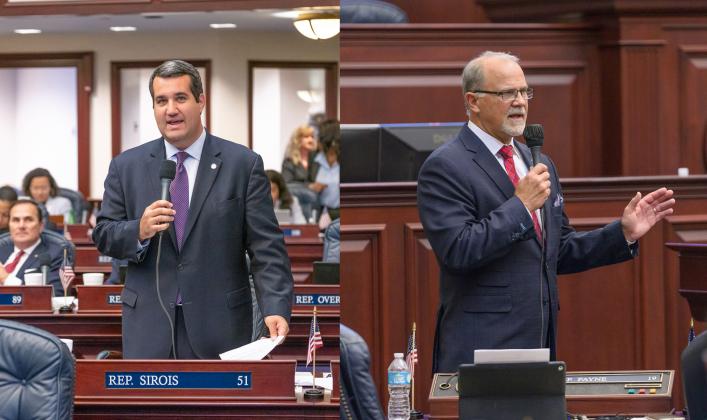Rep. Bobby Payne, R-Palatka, and Rep. Tyler Sirois, R-Merritt Island, filed the proposal that would lower the minimum age from 21 to 18 to buy rifles and other “long” guns
By Casmira Harrison
Palatka Daily News
charrison@palatkadailynews.com
and
Jim Saunders
News Service of Florida
TALLAHASSEE — Five years after lawmakers passed a bill to raise the minimum age to purchase a rifle or long gun, a bill was filed this week to drop the minimum age back down from 21 to 18.
On Monday, hours before the filing deadline for Florida’s 2023 legislative session, House Republicans Rep. Bobby Payne, R-Palatka, and Rep. Tyler Sirois, R-Merritt Island, filed the proposal labeled HB 1543.
If passed, the bill would essentially scrap part of the high-profile changes the previous Legislature enacted following the 2018 mass shooting at Marjory Stoneman Douglas High School in Parkland.
Reached Tuesday, Payne said the recent legislation attempts to fix what he views as a flaw in the Stoneman Douglas-inspired bill.
“There’s a lot of positives there,” Payne said of the original legislation known as the Marjory Stoneman Douglas High School Public Safety Act. Payne noted the law hardened schools, created an oversight office and committee, established the School Guardian Program and increased mental health services and training for schools across the state.
But Payne feels the age change “punished everybody” for actions taken by a few.
“You can fight in a war at 18. You can vote,” Payne said. “But you can’t buy a long gun.”
Lawmakers in 2018 increased the minimum age from 18 to 21 to purchase long guns after former Marjory Stoneman Douglas student Nikolas Cruz, then 19, used a semi-automatic rifle to kill 17 students and faculty members and injure 17 others.
Federal law already barred people under 21 from buying handguns.
The Republican-controlled Legislature’s 2018 decision was highly unusual in a state that had expanded gun rights over decades. The National Rifle Association immediately filed a challenge in federal court, arguing the law violated the Second Amendment.
Chief U.S. District Judge Mark Walker in 2021 upheld the constitutionality of the law. Walker said he was following legal precedent, though he also described the case as falling “squarely in the middle of a constitutional no man’s land.”
The NRA appealed to the 11th U.S. Circuit Court of Appeals. A panel of the Atlanta-based appeals court heard arguments in May but has not ruled.
During the arguments, NRA attorney John Sweeney contended that 18-year-olds in Florida “do not enjoy the same freedoms guaranteed the rest of the adults in this country” by the Second Amendment.
But in a document filed in district court, attorneys for the state wrote that people ages 18 to 20 are a “particularly high-risk group” and pointed to scientific evidence about impulsive and risky behavior.
“Empirical evidence bears out that because 18-to-20-year-olds are uniquely likely to engage in impulsive, emotional, and risky behaviors that offer immediate or short-term rewards, drawing the line for legal purchase of firearms at 21 is a reasonable method of addressing the Legislature’s public safety concerns,” the document said.
In his ruling upholding the law, Walker, in part, focused on a landmark 2008 U.S. Supreme Court case known as District of Columbia v. Heller. While the Heller case is broadly considered a major victory for gun-rights supporters, it also said certain “longstanding prohibitions” about guns do not violate the Second Amendment, according to Walker’s ruling.
The Heller case cited prohibitions on such things as felons and mentally ill people possessing guns, Walker concluded that restrictions on 18-to-20-year-old people buying guns were “analogous” to the restrictions cited in the Heller case.
Local Democrats questioned the decision to change the minimum age.
“My big question is, why? Why would they do that,” said Fran Rossano, president of the Putnam County Democratic Women’s Club, who also referenced another bill filed to initiate “constitutional carry,” proposals in the House and Senate that would allow people to carry concealed weapons without licenses. “It’s only contributing to more death.”
Payne, who also co-sponsored the constitutional carry bill, said any time the Legislature is dealing with Second Amendment issues, it is difficult if not impossible to please everyone.
“You never fit in the eye of the needle on these things,” Payne said, adding that some people criticize legislation as going too far and others proclaim the bills don’t go far enough.
“Criminals are going to be criminals,” Payne said. “This (legislation) is for law-abiding citizens.”
As of Tuesday evening, a companion Senate bill had not been filed. The House version had undergone a first reading.

